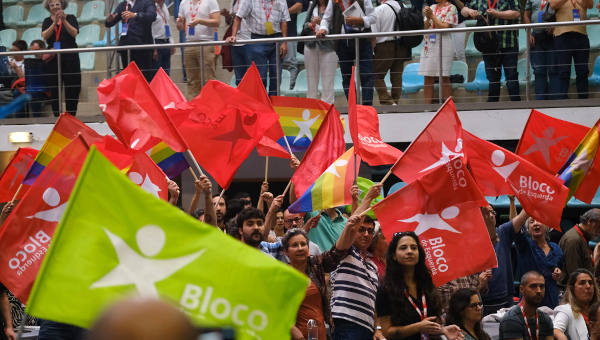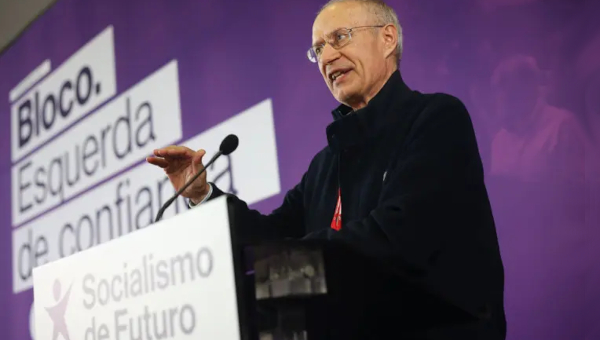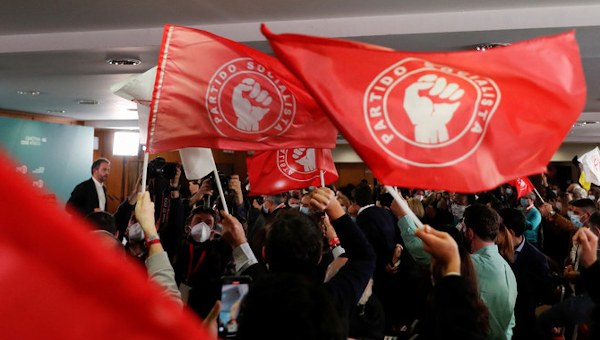A day before the right wing coalition government in Portugal was to vote through its 2013 budget, the German finance minister Wolfgang Schäuble met his Portuguese counterpart Vitor Gaspar and proclaimed, “Portugal is on the right path and is, for all of us in the Eurozone, a brilliant example that the approach we have been following to stabilize the Euro is correct.” Schäuble went on to praise the “exceptional job” being performed by the Portuguese government. But recent events have shown that the austerity measures insisted on by the ‘Troika’ of the European Union, European Central Bank and IMF are creating serious fissures inside the ruling coalition, growing resistance at the base of society and widespread debate inside of the parliamentary and extra-parliamentary left.
 The ruling coalition is made up of the Social Democrats (PSD), which despite its name is a right wing party, and the Conservatives (CDS). While the implementation of the Troika’s austerity measures may have earned Portugal the label of “the good pupil of the Eurozone,” Portugal’s deficit still stands €1.4-billion away from reaching the Troika’s target for 2012.
The ruling coalition is made up of the Social Democrats (PSD), which despite its name is a right wing party, and the Conservatives (CDS). While the implementation of the Troika’s austerity measures may have earned Portugal the label of “the good pupil of the Eurozone,” Portugal’s deficit still stands €1.4-billion away from reaching the Troika’s target for 2012.
Since the €78-billion heavy bail-out package in 2011 the government has embarked on what the Economist magazine called a “brutal” austerity course, equivalent to a “fiscal atomic bomb.” Civil servants’ salaries over €1,500 have been slashed by up to 10 per cent, those earning over €1,000 have had their holiday pay scrapped and more than 600,000 public sector workers (around four out every five public sector workers) are at risk of losing their jobs.
Unemployment and Emigration
These attacks on workers’ contracts and conditions have been part of Portuguese capital’s long-term strategy for reducing labour costs, creating high employment and boosting competitiveness inside of the Eurozone so as to attract foreign investment. As a consequence almost 50 per cent of the Portuguese workforce are on temporary contracts.
The unemployment rate lies above 15 per cent and is predicted to rise further next year. Unlike other southern European countries where youth unemployment exceeds 50 per cent in Portugal it ‘only’ amounts to 27 per cent as large numbers of young people have been forced to emigrate. More than 10,000 under 25 year olds have migrated in the last four months alone, many of them have moved to countries such as Germany and Britain, while others have headed to Portugal’s former colonies in Angola, Mozambique and Brazil. Recently prime minister Passos Coelho even told a group of teachers faced with unemployment to emigrate if they couldn’t find jobs.
The €3.5-billion cuts to healthcare, social security and education announced in the budget for 2013 will only plunge Portugal deeper into crisis and recession. The hard-line approach led by the Social Democrats has allowed its coalition partner the Conservatives to pose as the more moderate force.
While they continue to vote through the austerity measures prescribed by the Troika, the Conservatives’ verbal distance from Coelho and Gaspar’s more radical reforms have created tensions inside the government. As unlikely as a break-up of the coalition may seem it did take the intervention of the Portuguese president to lower the temperature inside the coalition faced with a by-election next year.
Wrapped in the language that calls for the “re-foundation” of the Portuguese state, the current austerity policies threaten to uproot the gains made by the revolution in 1974-75, when a coup by a group of left wing military officers against the fascist Salazar regime led to a wave of popular and workers’ power. While other European countries received their first taste of neoliberalism in the late 1970s and 1980s, Portugal was establishing a welfare state as part of the post-revolution settlement.
A deepening recession, the grim prospect of more bail-outs and the potential for EU budgetary targets to be missed all point toward the possibility of further fracture lines developing at the top of Portuguese society over the coming months.
The weekend before the 14 November general strike one such fracture appeared when 10,000 active and retired members of the military in civilian dress marched against austerity through the capital, Lisbon. Some officers complained that their salaries have been cut by as much as 25 per cent. One banner read “The military is unhappy, the people are unhappy.” Given the role that radical officers played in the 1974-75 Revolution, many people supported the military’s protest. Later on television, one member of the military went on to say, “We will do everything so that the indignation of the people will not be suppressed.”
Sparks of Resistance
On 15 September a demonstration was called by a group of artists, intellectuals and public figures under the banner of “Screw the Troika! (Que Se Lixe a Troika!) We want our lives!” From small villages in the Azores to the Algarve, to the industrial cities of Lisbon and Porto, more than 600,000 people took to the streets against the government’s proposal to increase workers’ social security contributions by 7 per cent (some reports put the turnout on the protests as high as one million, out of a population of just 10.5 million).
The demonstrations were key to forcing the government to backtrack from their initial proposal. Importantly, they sparked a new wave of popular mobilizations culminating in the general strike on 14 November.
The size of the demonstrations on 15 September even surpassed those of 1974. But while the mobilizations in 1974 saw people hugging and kissing each other and overflowing with joy, the demonstrations on 15 September were very different, reflecting the fear and anger workers feel faced with all social gains made by the revolution disappearing in front of their eyes.
While a small group of activists were able to make a massive impact with their call on 15 September, it also exposed the lack of political organization on the ground. The scale of the demonstration was a surprise to everyone including seasoned trade union activists and those of the radical left in the Left Bloc (Bloco de Esquerda). While Left Bloc members did become part of organizing the local demonstrations, the still important Communist Party failed to call on its members to join the protests until an hour prior to the start of the rallies.
A few weeks later though the weaknesses of initiatives such as “Que Se Lixe a Troika” would be exposed when they called for a demonstration against Angela Merkel’s visit to Lisbon and only a couple of hundred activists turned up.
The 14 November general strike was a massive success for the Communist-led CGTP trade union federation compared to its strike back in March this year. Despite the Socialist Party influenced UGT union federation denouncing the strike as “sectarian” and calling on its members to work, a number of local UGT-affiliated branches did decide to walk out. These rifts were further exposed when the Socialist Party mayor of Lisbon came out in support of the strikers’ demands. While the Socialist Party remains committed to a pro-austerity position, pressure from the trade union movement has shown the possibility of pulling it leftwards.
The CGTP is strongest in the public sector while the private sector remains largely non-unionized. In Lisbon, I visited a picket line of about 40 to 50 bin workers who were out picketing from about 10pm the evening before the general strike. Only two out of 123 workers attempted to cross the picket lines. Hospital, transport and postal workers ensured that the public sector ground to a halt for the day. Even the airline company TAP had to cancel 48 per cent of its flights. Postal workers of the recently privatized CTT company complained about having lost sick pay, Christmas and holiday pay as well as being forced onto temporary contracts.
New Initiatives
Despite their small size, political initiatives such as “Estudantes pela Greve geral” (Students for the General Strike) and “Precarios Inflexiveis” (which campaigns over casualization and temporary contracts) and rank and file trade union members forced the CGTP to call demonstrations in Porto and Lisbon on the day of the strike, something that hasn’t always happened in previous strikes. More than 3,000 strikers marched in Porto, while in Lisbon around 7,000 took to the streets. As the demonstration wound its way through the narrow hilly streets of Lisbon people joined in from the houses and apartments chanting “Greece, Spain, Ireland, Portugal – the struggle is international.”
Later that evening, after the speeches by CGTP union leaders had ended, protesters pulled down the fences that separated the masses from parliament and started throwing rocks, eggs and other objects toward a line of riot police protecting the building. As night time fell over the capital, the police decided to clear the square outside of parliament and the day ended in a pitched battle between protesters and the state.
Following this incident, CGTP leader Armenio Carlos declared, “I won’t give any moralistic speeches but I sincerely regret the actions taken tonight.” While activists argued that the statement could have been worse, it has drawn new battle lines in a fragile movement with hardly any roots in the unions and a strong Communist Party which could pull the plug on any further action.
The government’s decision to raise the wages of the police and the paramilitary gendarmerie by 11 per cent following the general strike is aimed at creating a wedge between a demoralized police force imbued with the memory of the revolution and a growing strike and protest movement.
While the Communist Party would like to channel the movement toward next year’s by-elections, the dockers have instead provided a new focus for resistance. Over the course of the last three months they have paralyzed most of south Portugal’s ports through a work to rule action over a new labour code meant to relax employment regulations. Thousands have participated in solidarity demonstrations, while hundreds of dockers have turned out for Angela Merkel’s visit to Lisbon, for example. In turn, the CGTP has been forced to call a demonstration to support the dockers’ day of action.
While the lack of political organization has contributed to the volatility of the situation it also places limits on the Portuguese movement against the Troika. Creating rank and file networks inside unions and networks of activists in the neighbourhoods, schools and universities will be crucial if the movement is to turn the sparks of resistance into raging bonfires.
Unless there is a bigger political challenge from the streets and greater pressure from below, the risk is that the movement will be at the mercy of the actions of the CGTP and Communist Party leaders who view the strike movement as something distinct from the fight for political power. Today, as in 1974, the Communist Party has little interest in creating rank and file networks which could spiral out of its control and create a real challenge to the stability of the system.
Debates in the Movement
The demonstrations on 15 September showed that mass mobilizations could derail unpopular austerity measures like the increase in social security contributions – a powerful lesson. The general strike on 14 November will have further strengthened the movement as workers paralyzed the whole of the public sector for the first time.
The volatility and sudden shifts have thrown up many questions among activists. However, there are two interlinked questions which the anti-capitalist and revolutionary left will have to provide clarity over: Could a left government made up of the Left Bloc, the Communist Party and the Socialist Party stop the Troika and austerity? And how do we transform resistance into a project which can change the balance of forces and even transform society?
At the Left Bloc congress in mid-November delegates debated the prospect of breaking the ruling coalition and the establishment of a left government. Many believe that the rapid rise of the radical left coalition Syriza in Greece earlier in June show the possibilities for the left in Portugal. However, the recent history of the two coalitions is very different. Syriza’s rapid rise is the product of the near continuous popular mobilizations and repeated general strikes which have marked Greece for more than four years now.
The Left Bloc, however, was electorally decimated in elections in 2011 when it lost half of its 16 members of parliament. Currently the Left Bloc stands at 7.5 per cent in the opinion polls. Even with the support of the Communist Party, which advocates a “left and patriotic government,” the forces for such a project would still only come to roughly 17 per cent. While this is impressive, it is far short of a majority. This leads the Left Bloc to look toward the Socialist Party which advocates “intelligent austerity” and is currently leading in the polls.
Francisco Louçã, the Left Bloc’s leading figure over the last period, has argued that a left government would be “government of the social movements that are running through the arteries of the Republic.” What would the relationship of such a government to the movements be? While those questions were raised by the left tide that swept Latin America earlier this century, the European parliamentary and extra-parliamentary left are confronted with them ten years on.
The two-day debate at the Left Bloc’s Congress tried to come to terms with this. Some delegates argued that the left government is a necessary step in the transition to socialism and a revolutionary tool that can transform anger at injustice into active mobilization. However, any government that dares to step out of line would be confronted with the dictates of the European Union as well as the hostility of Portuguese capital.
Rank and File
For the Portuguese workers and anti-austerity movement the most urgent task is to build rank and file networks that can go beyond the one-day set-piece strikes called by the CGTP. Such networks of workers could help people who have to choose whether to pay for their rent or put food on their plates, facilitate solidarity and take action to coincide with the dockers who are waging a heroic battle. They would also need to confront political questions such as the Communist Party’s insistence that the fight against the Troika is a national liberation struggle, when it is clearly a class struggle.
As Paolo, a postal worker, argued on the picket line on the day of the general strike:
“It’s fantastic that workers everywhere are striking today. But this struggle should have happened when austerity first started. The last government started this drive for austerity by slashing public services, our salaries, and raising taxes for the poor. I haven’t seen anything like this since the revolution back when I was three years old. This is a struggle of workers against the capitalists. We need the same to happen here as in Greece and Spain.” •
Mark Bergfeld recently attended the congress of the Left Bloc in Portugal and witnessed the general strike there a few days later. This article first published on the socialistreview.org.uk website.





